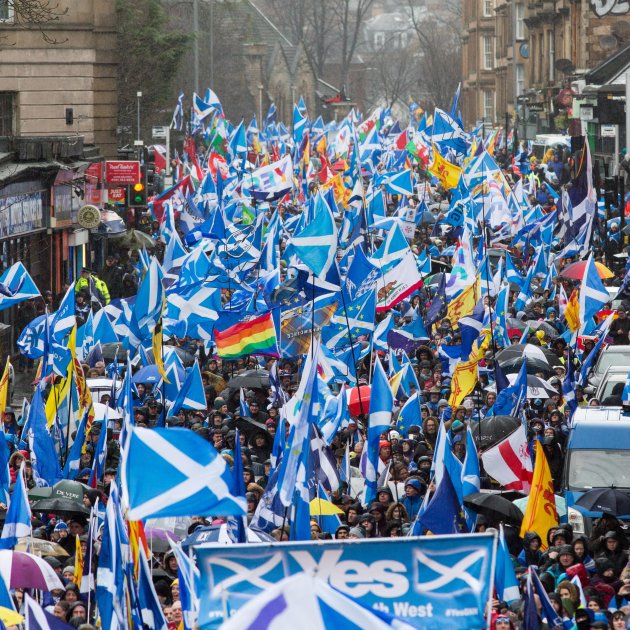The UK Supreme Court has ruled unanimously that the Scottish Parliament has no powers to call a second Scottish self-determination referendum without the approval of the UK government in London. Thus, the five judges agree that the Holyrood parliament cannot go ahead with a referendum law because it would interfere in constitutional issues over which only Westminster has parliamentary sovereignty. In the public reading of the resolution, the court affirmed that the decision was made quickly not only because all judges agreed, but because they believed it was "in the public interest" to resolve the unknowns as soon as possible.
It should be remembered that, with regard to Scotland's 2014 indyref, a court resolution of this question was not necessary because the governments in Edinburgh and Whitehall reached political agreement. This time, however, and in the face of the repeated refusals from down south on allowing Scots another independence vote, Scottish first minister Nicola Sturgeon decided to go for a legal approach and propose that the Holyrood chamber pass legislation for a second referendum without it being clear whether it has the powers to do so in the absence of Westminster backing. The public's reaction to this verdict will be visible on the streets this afternoon, with demonstrations having been called throughout Scotland and Europe. The main one will take place in front of the Scottish Parliament at Holyrood, where they hope to gather 5,000 people "in defence of democracy", while there are also organized shows of support in emblematic places in five European cities. According to independence supporters, it is the response of the Scottish people that will determine the future of the movement.
What was the Supreme Court asked to decide today?
The Scottish government's legal adviser, the Lord Advocate, took the proposed law to allow a second referendum to the highest constitutional court in the UK after expressing doubts that Holyrood had the powers to pass such legislation without the approval of Westminster. The government of Scotland argued that it could invoke the devolution of powers from Westminster to Holyrood in the face of London's refusal to agree politically, a true legal enigma that has never had a clear answer from the courts until now. On the one hand, the Nicola Sturgeon-led government says that Holyrood does have the power to call a referendum, because that in itself would not necessarily mean that it would be binding. Thus, trying to mask it as a consultation to find out what Scots think on the matter, Sturgeon proposed holding the vote without confirming whether it would make the result effective if 'yes' won. On the other hand, the British government argued during the hearing that the court could not take a position on the aforementioned referendum law, because the Scottish parliament had not even passed it yet.
Thus, in essence, the background to the issue was what the relationship between Scotland and the United Kingdom really is, and who has parliamentary sovereignty when matters of membership of the Union are on the table. More specifically, the Supreme Court had to address three specific questions in today's resolution: 1) Whether or not the issue raised by the Lord Advocate falls within the scope of devolution (the 1998 Scotland Act returning some powers to the Scots); 2) Whether the Supreme Court should take a position on the issue, and; 3) Whether the referendum law would interfere with powers reserved for the Westminster Parliament as stipulated in the Scotland Act.
What has been decided?
In the decision announced this Wednesday, the five judges of the Supreme Court have concluded that the Holyrood parliament cannot go ahead with this law because it would involve legislating on constitutional issues reserved for Westminster. The judge who read the decision agreed with the Scottish Lord Advocate on the first two points raised: that the Supreme Court had to rule on the issue, even before the Scottish Parliament passed the referendum legislation and that this was a matter affecting the United Kingdom's unwritten constitution. On the third key point, the court did not agree with the Scottish government, because the "practical effects" of holding a referendum, even if merely consultative, could affect the democratic quality of the Union, and the result of the consultation would end having "political authority". Faced with the uncertainty that this situation would generate in political and legal terms, the court opted for prevention rather than cure, and thus affirmed that the proposed law would lead to the Scottish Parliament interfering with powers that it does not have, as stipulated in the 1998 Scotland Act on the devolution of UK power.
And now what?
According to statements that Nicola Sturgeon has made in the months since she announced the referendum for October 2023, the Scottish government's plan B in the face of the Supreme Court's refusal is to treat the next UK general election in 2025 as a de facto referendum. Overall, it seems that the first minister places her confidence in using political power to negotiate a second referendum with Downing Street, either through the pressure that a non-binding consultation would generate, or via an election campaign focused on making independence effective.
